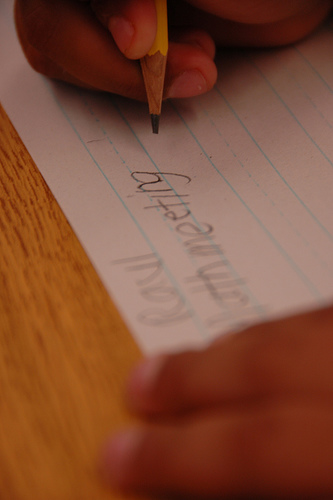Don't Stress About Verb Tenses (In The Word Cellar)
 Wednesday, April 28, 2010 at 7:56PM
Wednesday, April 28, 2010 at 7:56PM So far, most of these "In The Word Cellar" columns have looked at theories and ideas behind writing. I love that stuff, but it's time to get down and dirty, to dig into the rich soil of language. I'm talking about the nitty gritty tips that help you find the sweet spot where technique supports, expands, and deepens inspiration.
And nothing is nittier or grittier than verbs. Verbs create the action in your stories. Verbs are action. Good verbs tickle and caress your nouns. They make your writing sing and sizzle; they impact your story's mood and movement.
There's so much to talk about, but today we'll look at verb tenses.
Past or Present: What's better?
You already use verb tenses without thinking much about them. Past, present, and future -- all very simple. In fact, these are called the "simple tenses." Many stories (fiction and nonfiction) are told in the simple past tense. This is an easy, straightforward way to craft a story.
Alternately, you can write a story in simple present tense. This technique infuses your writing with energy and gives it a sense of immediacy. It helps to pull your readers into the scene so they feel like they're part of the action. On the other hand, present tense can be a bit tricky to maintain in a long piece of writing because it can begin to feel contrived. But it's a great option for some blog posts and essays. I think present tense works well for humorous stories, but it can also work well in stories with poignant emotion.
TIP: If a piece of writing feels flat or just doesn't seem to be "working," try rewriting a small portion of it in another tense. Then see if it flows better in the new tense.
(You'll usually stick with past or present tense for this. Writing a whole story in future tense creates a much different feel and isn't usually the best choice. But it could be a fun experiment, so give it a try and see what happens. You might like it for certain pieces.)
EXAMPLE (past tense): I woke up and looked over at Marie's beach towel. She wasn't there, but her romance novel and bikini top were. I scanned the beach for her. When my eyes reached the water line, I saw Marie running in the surf and laughing, like a bare-chested Baywatch beauty. I thought to myself, "It's going to be a long week."
There's nothing wrong with this little scene in past tense. But for fun, let's see how it feels in present tense.
EXAMPLE (present tense): I wake up and look over at Marie's beach towel. She isn't there, but her romance novel and bikini top are. I scan the beach for her. When my eyes reach the water line, I see Marie running in the surf and laughing, like a bare-chested Baywatch beauty. I think to myself, "It's going to be a long week."
In this example, both tenses work. The present tense version feels more immediate, but the past tense version works just as well. In a case like this, you'd choose your tense based on the rest of the story and the effect you want to create.
Whatever tense you choose, be consistent. Using verb tenses consistently helps to create clarity. In other words, don't start a story in one tense and then randomly shift into another unless the action of the story warrants it.
When would a shift in tenses be warranted? This is where the perfect tenses can come into play.
Past Perfect: Deeper into the past
First of all, what are these so-called perfect tenses? For a thorough overview, check out this handy explanation from Purdue's Online Writing Lab (OWL). If you just want the fast and dirty version, here are examples of the perfect tenses.
Past Perfect: I had skinny dipped.
Present Perfect: I have skinny dipped.
Future Perfect: I will have skinny dipped.
Since past perfect is the one that trips up a lot of writers, let's look at it. Here's how OWL explains it: "The past perfect tense designates action in the past just as simple past does, but the action of the past perfect is action completed in the past before another action." Before your eyes glaze over, read this tip.
TIP: What if you're writing a story in the simple past tense and want to refer to something that happened before the scene of the story? You need to go deeper into the past. This is when you use the past perfect tense. Think of the simple past tense as the "now" of the story. You use past perfect to indicate action that happened before the scene at hand.
Here's an example: I woke up and looked over at Marie's beach towel. She wasn't there, but her romance novel and bikini top were. Marie had said she wanted to try a topless beach, but I'd thought she'd meant next week in France, not here in New Jersey!
The first two sentences are in simple past tense. They set the simple past tense as the "now" of the story. The last sentence uses past perfect tense. Marie made the comment about trying a topless beach before this scene in the story. Using the past perfect tense ("Marie had said") makes this clear to the reader.
If I had written that last sentence in simple past ("Marie said she wanted to try a topless beach...."), it would seem like Marie was saying it in this scene. But Marie is running around half-naked down by the water and not saying anything in this scene.
I know this might seem nitpicky. But remember: The nitty gritty details create the texture of your writing. Readers may be able to handle a few verb tense slip-ups, but too much inconsistency will give them verbal whiplash. Using consistent and appropriate verb tenses creates clarity and smoothness in your writing. When the sequence of events is clear, your readers won't have to think about verb tense at all; they'll just enjoy the ride.
TIP: Verbs -- and their tenses -- work best when they are clear, concise, and consistent.
Summary
1. Be clear, concise, and consistent with your verb tenses.
2. Past tense is easy to use and works for a lot of different stories.
3. Writing in present tense can add urgency, immediacy, and intimacy to your story.
4. Try rewriting a piece in a different tense to see if that improves its flow and feel.
5. Past perfect tense takes you deeper into the past. It indicates action that happened before the "now" of a story that is already being told in simple past tense.
Question: Is all of this old hat to you? Or did you learn something new today? I want to tailor these columns to you, so tell me what you need!
**Have a writing question? Send it to jennifer{at}thewordcellar{dot}com.**
In The Word Cellar columns run on the second and fourth Wednesday of the month. Check out other articles in the series here.
 in the word cellar,
in the word cellar,  writing,
writing,  writing life,
writing life,  writing tips
writing tips 





